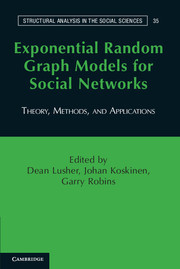Exponential Random Graph Models for Social Networks Theory, Methods, and Applications Structural Analysis in the Social Sciences Series
Coordonnateurs : Lusher Dean, Koskinen Johan, Robins Garry

Dr Johan Koskinen is Lecturer in Social Sciences at the University of Manchester. He is a statistician working with statistical modeling and inference. Focusing on social network data, Dr Koskinen deals with generative models for different types of structures, such as longitudinal network data, networks nested in multilevel structures, and multilevel networks classified by affiliations.
Garry Robins is Professor in the School of Psychological Sciences at the University of Melbourne. Robins is a mathematical psychologist whose research deals with quantitative and statistical models for social and relational systems. His research has won international awards from the Psychometric Society, the American Psychological Association, and the International Network for Social Network Analysis.
Date de parution : 11-2012
Ouvrage de 360 p.
15.2x22.6 cm
Disponible chez l'éditeur (délai d'approvisionnement : 14 jours).
Prix indicatif 39,35 €
Ajouter au panierDate de parution : 11-2012
Ouvrage de 352 p.
15.8x23.5 cm
Disponible chez l'éditeur (délai d'approvisionnement : 14 jours).
Prix indicatif 88,35 €
Ajouter au panier


